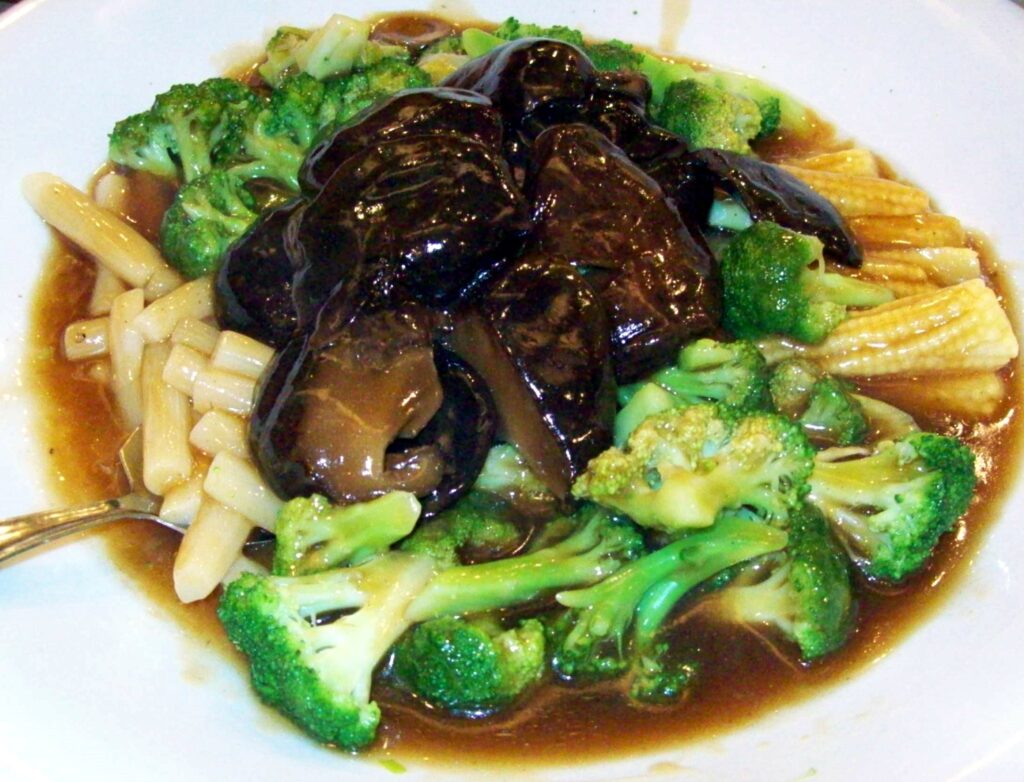Text and Photos by Henrylito D. Tacio

Do not judge a book by its cover. This adage comes to mind when it comes to broccoli. It may not be the most enticing vegetable, aesthetically speaking, but knowing its health benefits will have you smitten in no time.
In the United States, broccoli has gotten a bad reputation as being one of the most dreaded vegetables on the dinner plate for a child. So much so that some of them grew up and still don’t like it. Take the case of George H.W. Bush who, as president, famously declared his dislike for broccoli.
“And I haven’t liked it since I was a little kid and my mother made me eat it. And I’m president of the United States, and I’m not going to eat any more broccoli!” the 41st American president said in 1990.
On the contrary, the current American president considers broccoli as his favorite. Barack Obama likes it steamed though. “(In) my family, when they cooked vegetables, they were all boiled,” he said. Since then, the president has learned that healthy food can also taste good.
A paper published in The American Journal of Clinical Nutrition considers broccoli as one food that stands out as “very healthy.”
In his book, “Stay Younger, Live Healthier,” Dr. Willie T. Ong says that “a cup of steamed broccoli (146 grams) provides a wide range of nutrients.” These include 46 calories, 4.6 g protein, 8.7 g carbohydrates, 6.4 fiber, 178 g calcium, 1.8 mg iron, 50 ug Vitamin A. 0.13 mg thiamin (Vitamin B1), 0.32 mg riboflavin (Vitamin B12), 0.27 mg Vitamin B6, 90 ug folate, and 98 mg Vitamin C (twice the recommended daily allowance).
The United States Department of Agriculture says broccoli has more Vitamin C than an orange and as much calcium as a glass of milk. One medium-sized stem has three times more fiber than a slice of wheat bread.
Broccoli is an ideal vegetable for those on a diet as it is considered a low calorie food. “Each cup of steamed broccoli contains only 46 calories,” Dr. Ong writes. “The high fiber content of its stem makes one feel fuller. For adults and children on a weight-loss program, steamed broccoli spears can be an alternative snack.”
As it contains several antioxidants – such as beta-carotene, Vitamin C, and glutathione – broccoli is indeed a unique vegetable. “Some people take glutathione in supplement form but some experts say that this may not be as effective as the natural form found in broccoli,” Dr. Ong informs. “Glutathione is said to work by helping the liver neutralize cancerous substances and pollutants, including mercury and lead.”
Unknowingly, broccoli has a strong, positive impact on the body’s detoxification system of a person. Recently, researchers have identified one of the key reasons for this detox benefit.
“Glucoraphanin, gluconasturtiian, and glucobrassicin,” reports World’s Healthiest Foods, “are three glucosinolate phytonutrients found in a special combination in broccoli. This dynamic trio is able to support all steps in body’s detox process, including activation, neutralization, and elimination of unwanted contaminants. Isothiocyanates are the detox-regulating molecules made from broccoli’s glucosinolates, and they help control the detox process at a genetic level.”
Like most vegetables, broccoli is also rich in fiber but also of beta-carotene and omega-3 fatty acids. All three help lower down bad cholesterol levels and maintain proper heart function and health. Chromium mineral found in broccoli is also known to promote proper insulin and regulate blood sugar levels, thereby regulating blood pressure.
Broccoli’s high fiber content also helps cure and prevent constipation. Its mineral and vitamin content helps maintain proper stomach acidity, facilitate healthy digestion, and ensures proper absorption of nutrients from the food a person eats.
Another health benefit from broccoli is its ability to prevent allergic reactions. Broccoli has the component called kaempferol which prevents allergies from being triggered. Since asthma is also a form of allergy, this vegetable will also benefit those who are suffering from this ailment.
Broccoli also reduces arthritis pain. So, instead of shoving in too many Ibuprofens in your mouth if arthritis begins to strike again, it is better to just increase your daily intake of broccoli. The isothiocyanates found in broccoli is a phytonutrient that negates inflammation.
In recent years, broccoli has made the headlines regarding three components found in the vegetable. For instance, indole-3-carbinol (I3C) has captured the attention of those looking to prevent hormone-related cancers, such as breast- and prostate cancer.
I3C promotes “good” hormones, while working against destructive ones. The sulforaphane in broccoli also helps to increase the level of enzymes that block cancer, while the beta-carotene in broccoli transforms into vitamin A within the body, providing an effective antioxidant that destroys free radicals (responsible for weakening the defense of cells).
Scientists believe there are other important cancer preventative agents in broccoli that have yet to be identified. Nutritionists, however, claim that boiling broccoli reduces the levels of suspected anti-carcinogenic compounds, such as sulforaphane, with losses of 20–30% after five minutes, 40–50% after ten minutes, and 77% after thirty minutes. However, other preparation methods such as steaming, microwaving, and stir frying had no significant effect on the compounds.
Here’s a tip on how to cook broccoli: “Some people avoid eating the stems of the vegetable, but peeling away the tough outer skin, slicing them into small pieces, or cooking them whole tastes great with a little teriyaki sauce. Overall, to get the health benefits of broccoli, it can be boiled, steamed, eaten raw, and baked with great-tasting accompaniments, such as a good tasting creamy cheese.”
Like other members of the cruciferous family (which include cauliflower, cabbage, bok choy, kale, and Brussel sprouts), broccoli contains goitrogens, naturally-occurring substances in certain foods that can interfere with the functioning of the thyroid gland. Individuals with already existing and untreated thyroid problems – like hypothyroidism – may want to avoid broccoli for this reason. As always, consult your doctor if unsure. – ###


